Alien Life: Oceans on Earth-Like Planets Vital to Sustain 'Stable Climate' for Extraterrestrials

Oceans are vital for extraterrestrial life to develop and survive on other planets as it moderates the climate, new research has shown.
British scientists from the University of East Anglia (UEA) have made an important step in the race to discover whether other planets could develop and sustain extraterrestrial life.
Until now, computer simulations of habitable climates on Earth-like planets have focused on their atmospheres and evidence of liquid water, but a new study shows the presence of oceans is vital for optimal climate stability and habitability.
Professor David Stevens, an applied mathmatician at UAE, said: "The number of planets being discovered outside our solar system is rapidly increasing. This research will help answer whether or not these planets could sustain alien life."
For the study, the researchers created a computer-simulated pattern of ocean circulation on a hypothetical ocean-covered Earth-like planet. They examined how different planetary rotation rates would impact heat transport with the presence of oceans taken into account.
"Until now, most habitability models have neglected the impact of oceans on climate," Stevens said, as reported by Live Science.
"Oceans have an immense capacity to control climate. They are beneficial because they cause the surface temperature to respond very slowly to seasonal changes in solar heating. And they help ensure that temperature swings across a planet are kept to tolerable levels."
With their model, the researchers investigated how changing the planet's rotation speed affected the transportation of heat when oceans were present.
"We found that heat transported by oceans would have a major impact on the temperature distribution across a planet, and would potentially allow a greater area of a planet to be habitable," Stevens said.
Although Mars is within the Sun's habitable region, otherwise known as the "Goldlocks zone", it has no oceans, which causes air temperatures to swing over a range of 1,000⁰C (1,832⁰F) he explained.
The number of potentially habitable exoplanets in the Milky Way is steadily growing, in part due to the work of Nasa's Kepler Telescope, which detects variations in the brightness of stars as planets pass in front of them.
According to the Nasa Exoplanet Archive, scientists have so far confirmed the existence of 1,739 planets outside our solar system, but there are thousands of more unconfirmed "candidates".
Earlier this month, the Tech Times reported that Nasa were looking for scientific instruments for a future mission to Jupiter's icy moon Europa, which is believed to harbour a sub-surface ocean.
"Oceans help to make a planet's climate more stable, so factoring them into climate models is vital for knowing whether the planet could develop and sustain life," Stevens said. "This new model will help us to understand what the climates of other planets might be like with more accurate detail than ever before."
The research was published today in the journal Astrobiology.
© Copyright IBTimes 2025. All rights reserved.






















